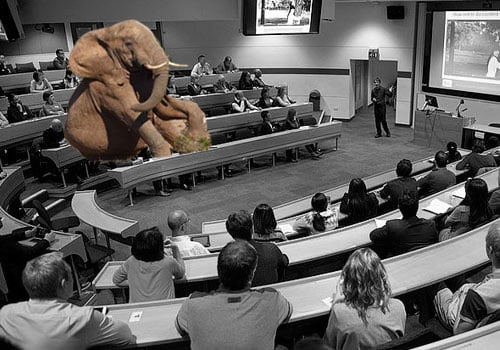The fate of the ATAR score is out in the open at the Universities Australia 2016 conference in Canberra this week.
Thankfully this discussion moves the focus from the “system” to real people: students as individuals with diverse, personal circumstances.
This important enrolment discussion puts the spotlight on the socio-economic education divide, and raises arguments for new levels of transparency and processes, and has further exposed the tension between regional and sandstone providers.
While it’s clear there are challenges ahead regarding the diminished significance of the ATAR, let’s turn to the elephant in the lecture theatre: What happens after enrolment?
 Discussion has been focused, with necessity, on entry requirements. Is it time to turn attention to how we can grow capability and deliver support?
Discussion has been focused, with necessity, on entry requirements. Is it time to turn attention to how we can grow capability and deliver support?
Some big voices have pressed for greater action around this next stage, and Education Minister Simon Birmingham stated this week: “Universities must take responsibility for those students they choose to enrol and ensure they have the capabilities and support to succeed.”
The challenge is: How?
 All students have achieved something remarkable with University entry; however, celebrations might be premature without considering next steps for support and first year experience. Source: The Age
All students have achieved something remarkable with University entry; however, celebrations might be premature without considering next steps for support and first year experience. Source: The Age
Look to some universities and you’ll see leaders are:
- Bridging the chasm between high school and further study with academically-based partnerships between universities and schools;
- Improving academic skills at scale and online by delivering e-learning experiences to large cohorts of students and addressing the needs of socioeconomically-diverse populations
- Meeting students' expectations for personalised support and service in first year
In practice:
- For first year and bridging students, three universities saw a course average increase between 15% - 17%, amongst students who used the one-to-one online support.
- For ethically enrolling more capable students: KPMG (2015) reported that personalised online support services like Studiosity provide high school students with the skills to strengthen academic pursuits: “My marks have improved dramatically, I think it’s based on YourTutor*. I’ve always had motivation but sometimes I don’t understand. YourTutor tutors help me by breaking things down.”
Universities are in a strong and credible position when it comes to their defence of diverse entry criteria; let’s move the discussion toward how to meet the repercussions.
*Studiosity was previously called 'YourTutor'.






